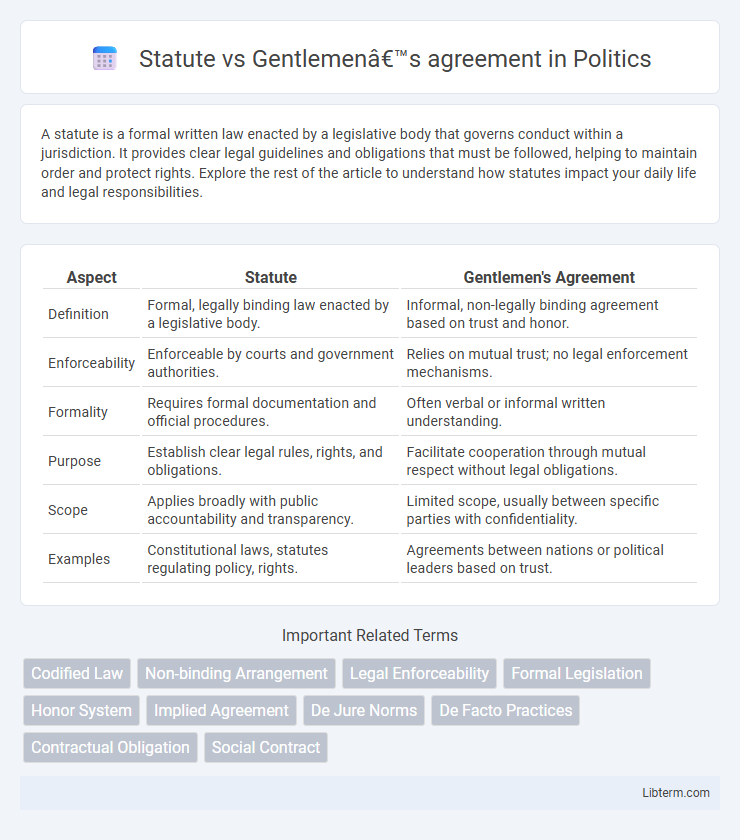A statute is a formal written law enacted by a legislative body that governs conduct within a jurisdiction. It provides clear legal guidelines and obligations that must be followed, helping to maintain order and protect rights. Explore the rest of the article to understand how statutes impact your daily life and legal responsibilities.
Table of Comparison
| Aspect | Statute | Gentlemen's Agreement |
|---|---|---|
| Definition | Formal, legally binding law enacted by a legislative body. | Informal, non-legally binding agreement based on trust and honor. |
| Enforceability | Enforceable by courts and government authorities. | Relies on mutual trust; no legal enforcement mechanisms. |
| Formality | Requires formal documentation and official procedures. | Often verbal or informal written understanding. |
| Purpose | Establish clear legal rules, rights, and obligations. | Facilitate cooperation through mutual respect without legal obligations. |
| Scope | Applies broadly with public accountability and transparency. | Limited scope, usually between specific parties with confidentiality. |
| Examples | Constitutional laws, statutes regulating policy, rights. | Agreements between nations or political leaders based on trust. |
Definition of Statute
A statute is a formal written law enacted by a legislative body that governs legal obligations and rights, providing clear and enforceable rules within a jurisdiction. Unlike a gentlemen's agreement, which is an informal and non-binding understanding based on honor and trust, a statute carries legal authority and consequences for non-compliance. Statutes regulate various aspects of social, economic, and political life, ensuring consistency and accountability under the law.
Definition of Gentlemen’s Agreement
A Gentlemen's Agreement is an informal, non-binding understanding between parties based on trust and honor rather than legal enforceability. Unlike a statute, which is a formal, written law enacted by a legislative body and enforceable by courts, a Gentlemen's Agreement relies on mutual respect and ethical conduct without legal obligation. This type of agreement often governs business or diplomatic interactions where flexibility and discretion are prioritized over rigid legal frameworks.
Legal Enforceability Differences
Statutes are formal laws enacted by a legislative body with clear legal enforceability, meaning violations can result in court action and penalties. Gentlemen's agreements rely on mutual trust without formal documentation, lacking the binding power of legal statutes and are typically unenforceable in courts. This fundamental difference highlights that statutes provide definitive legal rights and obligations, whereas gentlemen's agreements depend solely on the goodwill of involved parties.
Historical Context and Evolution
Statutes originated as formal, legally binding rules enacted by governing bodies to provide clear and enforceable regulations, often in response to societal needs for order and predictability. Gentlemen's agreements evolved as informal, trust-based understandings primarily used in business and diplomacy to facilitate cooperation without legal obligations. Over time, the reliance on statutes increased with the expansion of complex legal systems, while gentlemen's agreements persisted in areas where flexibility and discretion were valued.
Key Features of Statute
Statutes are formal, written laws enacted by legislative bodies, characterized by clear, codified rules that are legally binding and enforceable in courts. They provide specific guidelines with defined penalties for non-compliance, ensuring predictable legal outcomes. Unlike gentlemen's agreements, statutes offer transparency, formal documentation, and official authority, preventing ambiguity and promoting standardized compliance.
Key Features of Gentlemen’s Agreement
Gentlemen's agreements are informal, non-legally binding arrangements based on trust and mutual respect, often used to avoid formal contracts in business or diplomatic contexts. Unlike statutes, which are written laws enacted by legislative bodies and enforceable by courts, gentlemen's agreements rely solely on the honor of the parties involved and lack legal enforceability. Key features include voluntary compliance, confidentiality, flexibility in terms, and a focus on maintaining good relationships rather than legal obligations.
Examples in Law and Business
Statutes are formal legal codes enacted by legislative bodies, such as the Uniform Commercial Code regulating business transactions, while gentlemen's agreements are informal, non-binding understandings based on trust, common in industries like real estate or international trade without written contracts. In law, a statute like the Sarbanes-Oxley Act imposes mandatory compliance for corporate governance, contrasting with gentlemen's agreements in business where parties rely on honor, such as informal agreements between manufacturers and distributors to restrict territories. Statutes provide enforceable rights and penalties, whereas gentlemen's agreements depend on mutual respect and are often used when formal contracts are impractical or unnecessary.
Advantages and Limitations
Statute agreements provide legally binding obligations enforceable by courts, ensuring clarity and protection for all parties involved. Gentlemen's agreements offer flexibility and foster trust without formal legal procedures, allowing swift and informal arrangements. However, statutes can be rigid and bureaucratic, while gentlemen's agreements lack enforceability and may lead to misunderstandings or disputes due to their informal nature.
Statute and Gentlemen’s Agreement: Use Cases
Statute refers to formal laws enacted by legislatures, providing clear legal frameworks for contracts, property rights, and business regulations, ensuring enforceability and legal protection. Gentlemen's agreements are informal, non-legally binding understandings based on trust and honor, commonly used in business negotiations, partnerships, and diplomatic relations where flexibility and discretion are prioritized. Statutes are essential for regulatory compliance and dispute resolution, while gentlemen's agreements often facilitate quick agreements and maintain confidentiality in situations lacking formal contract necessity.
Impact on Modern Legal Practices
Statute laws provide clear, enforceable legal standards that form the foundation of modern judicial systems, ensuring consistency and predictability in legal outcomes. Gentlemen's agreements, based on trust and informal understandings without legal enforceability, have limited impact on contemporary legal practices but still influence business ethics and negotiations. The contrast between statutory regulations and informal agreements highlights the importance of codified laws in maintaining legal certainty and protecting parties' rights.
Statute Infographic

 libterm.com
libterm.com